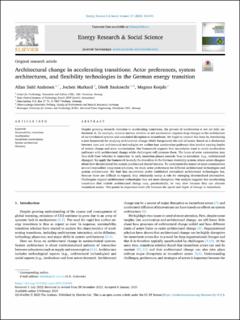Please use this identifier to cite or link to this item:
https://doi.org/10.21256/zhaw-28162| Publication type: | Article in scientific journal |
| Type of review: | Peer review (publication) |
| Title: | Architectural change in accelerating transitions : actor preferences, system architectures, and flexibility technologies in the German energy transition |
| Authors: | Andersen, Allan Dahl Markard, Jochen Bauknecht, Dierk Korpås, Magnus |
| et. al: | No |
| DOI: | 10.1016/j.erss.2023.102945 10.21256/zhaw-28162 |
| Published in: | Energy Research & Social Science |
| Volume(Issue): | 97 |
| Issue: | 102945 |
| Issue Date: | 2023 |
| Publisher / Ed. Institution: | Elsevier |
| ISSN: | 2214-6296 2214-6326 |
| Language: | English |
| Subjects: | Sustainability transition; Acceleration; Incumbent reorientation; System architecture |
| Subject (DDC): | 333.79: Energy |
| Abstract: | Despite growing research attention to accelerating transitions, the process of acceleration is not yet fully understood. It, for example, remains unclear whether or not acceleration requires deep changes in the architecture of sociotechnical systems and associated disruption to incumbents. We begin to unravel this issue by introducing a new framework for studying architectural change which foregrounds the role of actors. Based on a distinction between core and architectural technologies we outline four acceleration pathways that involve varying depths of system change and actor reorientation. Our framework suggests that incumbents want to avoid acceleration pathways with architectural change while challengers will promote them. The locus of actor contestation may thus shift from ‘whether to transition’ in early transition phases towards ‘how to transition’ (e.g., architectural changes). We apply the framework to study the transition in the German electricity system, where actors disagree about how decentralized the system architecture should become. To understand the nature of actor contestations around renewables integration solutions, we study actor preferences for different architectural technologies and system architectures. We find that incumbents prefer established centralized architectural technologies but, because these are difficult to expand, they reluctantly accept a role for emerging decentralized alternatives. Challengers support architectural technologies that are more disruptive. Our analysis suggests that accelerating transitions that include architectural change may, paradoxically, be very slow because they can alienate incumbent actors. This points to important trade-offs between the speed and depth of change in transitions. |
| URI: | https://digitalcollection.zhaw.ch/handle/11475/28162 |
| Fulltext version: | Published version |
| License (according to publishing contract): | CC BY 4.0: Attribution 4.0 International |
| Departement: | School of Engineering |
| Organisational Unit: | Institute of Sustainable Development (INE) |
| Published as part of the ZHAW project: | Pathways – Conflicting Transition Pathways for Deep Decarbonization SWEET PATHFNDR – Wege in eine effiziente Energiezukunft durch Flexibilität und Sektorenkopplung |
| Appears in collections: | Publikationen School of Engineering |
Files in This Item:
| File | Description | Size | Format | |
|---|---|---|---|---|
| 2023_Andersen-etal_Artitectural-change-in-accelerating-transitions.pdf | 3.96 MB | Adobe PDF |  View/Open |
Show full item record
Andersen, A. D., Markard, J., Bauknecht, D., & Korpås, M. (2023). Architectural change in accelerating transitions : actor preferences, system architectures, and flexibility technologies in the German energy transition. Energy Research & Social Science, 97(102945). https://doi.org/10.1016/j.erss.2023.102945
Andersen, A.D. et al. (2023) ‘Architectural change in accelerating transitions : actor preferences, system architectures, and flexibility technologies in the German energy transition’, Energy Research & Social Science, 97(102945). Available at: https://doi.org/10.1016/j.erss.2023.102945.
A. D. Andersen, J. Markard, D. Bauknecht, and M. Korpås, “Architectural change in accelerating transitions : actor preferences, system architectures, and flexibility technologies in the German energy transition,” Energy Research & Social Science, vol. 97, no. 102945, 2023, doi: 10.1016/j.erss.2023.102945.
ANDERSEN, Allan Dahl, Jochen MARKARD, Dierk BAUKNECHT und Magnus KORPÅS, 2023. Architectural change in accelerating transitions : actor preferences, system architectures, and flexibility technologies in the German energy transition. Energy Research & Social Science. 2023. Bd. 97, Nr. 102945. DOI 10.1016/j.erss.2023.102945
Andersen, Allan Dahl, Jochen Markard, Dierk Bauknecht, and Magnus Korpås. 2023. “Architectural Change in Accelerating Transitions : Actor Preferences, System Architectures, and Flexibility Technologies in the German Energy Transition.” Energy Research & Social Science 97 (102945). https://doi.org/10.1016/j.erss.2023.102945.
Andersen, Allan Dahl, et al. “Architectural Change in Accelerating Transitions : Actor Preferences, System Architectures, and Flexibility Technologies in the German Energy Transition.” Energy Research & Social Science, vol. 97, no. 102945, 2023, https://doi.org/10.1016/j.erss.2023.102945.
Items in DSpace are protected by copyright, with all rights reserved, unless otherwise indicated.